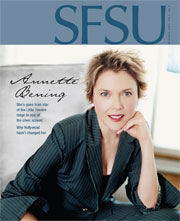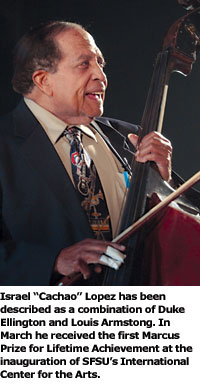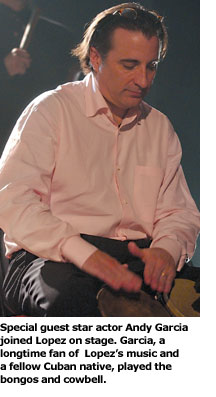 |
| ||||||||||
A New Window on the World SFSU alumni George and Judy Marcus recently presented a $3 million gift to the University to establish the International Center for the Arts. "We wanted something distinctive and special," says George Marcus, "to cultivate artists locally and internationally, to focus on SF State's qualities, attract students and bring in visiting professors and artists.⦠Most of all [the center] is going to be fun." Based in the College of Creative Arts, the new center -- part theater, part museum -- celebrates the world's most innovative art and artists, with a focus on documentary films and visual art. Through the center, the Marcuses will present three annual juried awards, each worth up to $50,000, to artists whose work demonstrates excellence, emerging talent or lifetime achievement. Festivals, exhibits and film screenings, each focused on a different foreign country, began in the spring.
"It's not like we're preaching to the converted," Professor Stephen Ujlaki, the festival's director and chair of SFSU's Cinema Department, told the San Francisco Chronicle. "It's more like we're reminding them of the environmental victories and losses happening all over the world right now. Because even the most environmentally conscious person doesn't always know what's going on in other parts of the world." About 25 films from 13 countries were shown at Green Screen. A tribute was paid to renowned Swedish filmmaker Stefan Jarl, who was on hand to screen several of his films about the aboriginal Sami peoples of Finland. Their rich cultural traditions, including those of farming and fishing, have suffered in part due to the devastation caused by the 1986 Chernobyl nuclear disaster. Jarl, who watched every film at the five-day festival, enjoyed the mix of sad and optimistic films. He hopes Green Screen will inspire more film festivals focused on environmental themes. "People are not aware of how important man's relation to nature is," he says. "In this globalized world we live in, we need to know how we destroy our planet and how we protect our planet." An entire day of films was dedicated to Slow Food, an international movement opposing fast food and promoting wholesome dining as a source of pleasure. Former Vice President Al Gore introduced "The Real Dirt on Farmer John," a documentary about a once-failing family farm in Illinois transformed into a sustainable, community-supported venture. Attendees also sampled the cinematic cuisines of France in "Harvest (Regain)," Great Britain and India in "A Love Supreme" and Gilroy in "Garlic Is As Good As Ten Mothers." In addition to hosting festivals, the center's Documentary Film Institute will also award grants to help filmmakers complete their documentaries. "We now have resources to bring films and filmmakers from around the world," says Ujlaki. "Funding for documentaries is extremely difficult to get⦠[and] more emphasis is [placed] on entertainment and diversion than on reality." The Godfather of Cuban Bass Jams with a Star of Godfather III
Born in Greece and raised in San Francisco, George Marcus (B.S., '65) completed his economics degree in two and a half years. Today his businesses include Essex Property Trust and Marcus and Millichap, the parent company of a diversified group of real estate, service, investment and development firms. Judy Marcus(B.A., '62), a fourth-generation San Franciscan and former physical education teacher, serves on the board of directors of the Montalvo Arts Center, the Humane Society Silicon Valley, Avenidas Senior Center and the Community Breast Health Project. Longtime friends of SFSU, the Marcuses have also provided generous financial support to the University's Center for Modern Greek Studies. | |||||||||||











 Israel "Cachao" Lopez has been called the "godfather of Cuban bass" and "our living Mozart." The reasons why were clear to those who heard him live in concert as part of the two-day inaugural program for the International Center for the Arts. The concert, held in March at Bimbo's 365 Club in North Beach, concluded "To Cuba With Love," a celebration of Afro-Cuban culture.
Israel "Cachao" Lopez has been called the "godfather of Cuban bass" and "our living Mozart." The reasons why were clear to those who heard him live in concert as part of the two-day inaugural program for the International Center for the Arts. The concert, held in March at Bimbo's 365 Club in North Beach, concluded "To Cuba With Love," a celebration of Afro-Cuban culture. Lopez was joined on stage by a special guest: actor Andy Garcia, known for his roles in such films as "The Godfather: Part III" and "Ocean's Eleven." Garcia, a longtime fan of Lopez's music and a fellow Cuba native, played the bongos and cowbell.
Lopez was joined on stage by a special guest: actor Andy Garcia, known for his roles in such films as "The Godfather: Part III" and "Ocean's Eleven." Garcia, a longtime fan of Lopez's music and a fellow Cuba native, played the bongos and cowbell.
